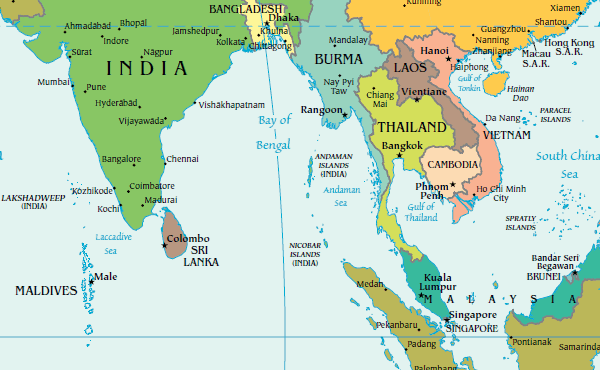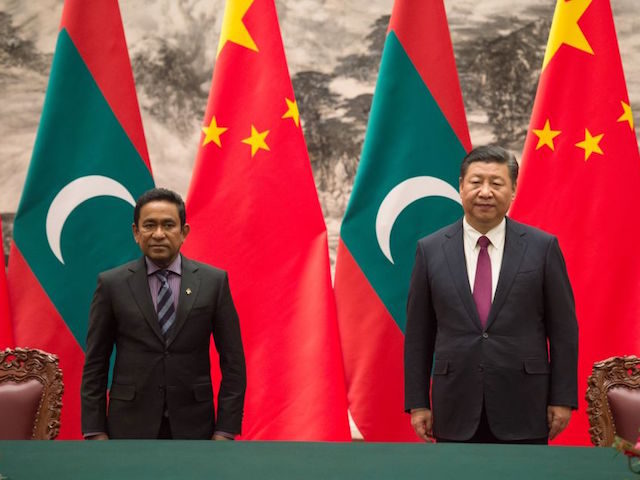This morning’s key headlines from GenerationalDynamics.com
- Maldives cannot determine how much money it owes to China
- Constitutional crisis continues in Sri Lanka over China-India competition
Maldives cannot determine how much money it owes to China

Map showing strategic location of Maldives and Sri Lanka in the Indian Ocean
Shortly after Ibrahim Mohamed Solih shocked the Maldives by winning the presidential election on September 23 decisively by 58-41 percent of the vote, he met with the Chinese ambassador to the Maldives, Zhang Lizhong, to ask how much money the Maldives owed to China. According to Solih, Zhang handed him an invoice for $3.2 billion. This was money owed for Chinese-funded infrastructure projects for China’s Belt and Road Initiative (BRI).
Solih’s election victory was a surprise because it had been expected that the election would go to the incumbent president Abdulla Yameen Abdul Gayoom, who had never hesitated to use vote-rigging or jailings or violence to win elections. However, Solih’s election margin of victory was so large that Yameen was forced to concede. Solih’s victory is also a major victory for India and a major loss for China since Yameen had close relations with China and Solih promised to balance Indian and Chinese influence.
So then there was another shock when Solih received the “invoice” from ambassador Zhang saying that Maldives owed China $3.2 billion. With annual revenues of $1.5 billion and an annual gross domestic product of around $3.9 billion, Maldives would be unable to service the debt and it appeared that Maldives had been the victim of a huge Chinese debt trap.
Solih took office a week ago and said that the country’s finances are worse than expected and that it will take weeks or months to untangle details of all the deals struck with Chinese firms. According to his assistant, Mohamed Nasheed:
We are at a loss to understand how much we really owe to China. Direct debt, or direct bilateral government-to-government debt is one thing, but there is on top of that sovereign guarantees for the private sector. And there is also on top of that our state owned enterprises who have gone into debt.
However, the Maldives central bank contradicts the $3.2 billion figure, estimating the country’s liabilities to China at $1.5 billion.
And now China is denying that the Zhang ever gave Solih a $3.2 billion figure, also saying that the correct figure is closer to $1.5 billion.
So the Maldives is sending its foreign minister Abdulla Shahid to China next month to renegotiate deals and to finally figure out how much Maldives owes to China.
China has negotiated many infrastructure debt deals with numerous countries. These deals are all secret and usually considered Chinese “debt traps” imposed on small countries. The situation with the Maldives is that, for the first time, one of these top secret deals may become public, and we will be able to see what the terms are and whether there was corruption involved on the part of the Yameen administration.
What we have seen so far in the Maldives case is that the financial relationship with China is a total mess. If and when deals with other countries become public, we can expect a similar mess.
The Maldives envoy Abdulla Shahid will be discussing another subject when he visits China next month: the joint Free Trade Agreement (FTA) that the two countries signed a year ago. According to the Maldives government, the FTA was rushed through parliament by the Yameen administration, but the Solih administration plans to cancel it because it is too one-sided.
Between January to August this year, the Maldives’ imports from China were $342 million, while its exports to China were just $265,270. The FTA specifies that there would be no tariffs on imports by either side from the other, but since China imports almost nothing from Maldives, the FTA is of benefit only to China. Canceling the FTA would be one more setback to China, which is facing an increasing chorus of accusations of “debt trap diplomacy” in many countries across the Pacific and Indian oceans. Avas (Maldives) and Reuters and Maldives Independent (30-Nov-2017) and Reuters (19-Nov) and Xinhua
Constitutional crisis continues in Sri Lanka over China-India competition
Sri Lanka is another country harshly victimized by China’s debt trap diplomacy. Sri Lanka, under former president Mahinda Rajapaksa, signed a huge finance deal with China to build the Hambantota seaport. But Sri Lanka was unable to service the debt and Rajapaksa’s successor was forced to hand control of the seaport over to China. So now China has control of an important strategic seaport on the Indian Ocean and an enclave of thousands of Chinese workers and their families on Sri Lankan soil.
So it was a great shock on October 26 when Mahinda Rajapaksa, the mastermind of the Hambantota project, was appointed prime minister by the current president, Maithripala Sirisena, after he fired the existing Prime Minister Ranil Wickremesinghe. Sirisena has never explained the reason for his decision, but it is believed that Wickremesinghe is close to India, while Rajapaksa is close to China. Wickremesinghe has refused to leave the prime minister’s residence, so for the last month Sri Lanka has had two prime ministers.
Sirisena also dissolved the parliament, but the parliament refused to be dissolved and remained in session. Last week, a vote was held to select the actual prime minister from the two choices and pandemonium broke out in the assembly when Rajapaksa’s supporters threw books, chairs, and chili paste at Wickremesinghe’s supporters in an attempt to keep from losing the vote.
On Friday, the parliament held another vote, this time to decide control of a crucial committee that sets the parliamentary agenda. When Wickremesinghe’s supporters won the vote, Rajapaksa’s supporters staged a walkout. Wickremesinghe argues that he still commands majority support within parliament and, despite being fired, he continues to occupy his official residence. On the other hand, Rajapaksa has lost two no-confidence votes in the parliament but has refused to stand down.
Despite having been forced to give up its Hambantota seaport to China, Sri Lanka still owes more than $50 billion to foreign lenders. Next year, it has to pay more than $4 billion in debt servicing. The current constitutional crisis is causing the value of the Sri Lankan rupee to plummet, which means that the $4 billion will be much harder to pay.
Both Sri Lanka and the Maldives are very important strategic locations in the India Ocean and seaports in those countries would be among China’s “String of Pearls” seaports in the Indian Ocean, giving China a major strategic advantage. However, pro-Indian governments in both island countries would hand significant setbacks to China. Al Jazeera and Reuters and Al Jazeera and South China Morning Post (29-Oct)
Related Articles:
- China and India compete for influence in Sri Lanka and Maldives constitutional crises (10-Nov-2018)
- Sri Lanka constitutional crisis represents opportunity for China (31-Oct-2018)
- China takes control of strategic Hambantota seaport in Sri Lanka, raising concerns in India (11-Dec-2017)
- Report: Sri Lankan government repeatedly torturing and raping Tamils (14-Jan-2016)
- Maldives crisis pits India vs China in the Indian Ocean (07-Feb-2018)
- Maldives in crisis as China-backed incumbent president Yameen loses election (24-Sep-2018)
KEYS: Generational Dynamics, Sri Lanka, Maithripala Sirisena, Ranil Wickremesinghe, Mahinda Rajapaksa, India, Hambantota port, China, Zhang Lizhong, Belt and Road Initiative, BRI, Maldives, Abdulla Yameen Abdul Gayoom, Ibrahim Mohamed Solih, Mohamed Nasheed, Abdulla Shahid
Permanent web link to this article
Receive daily World View columns by e-mail

COMMENTS
Please let us know if you're having issues with commenting.